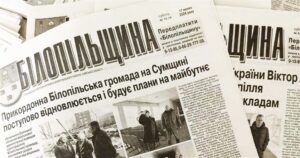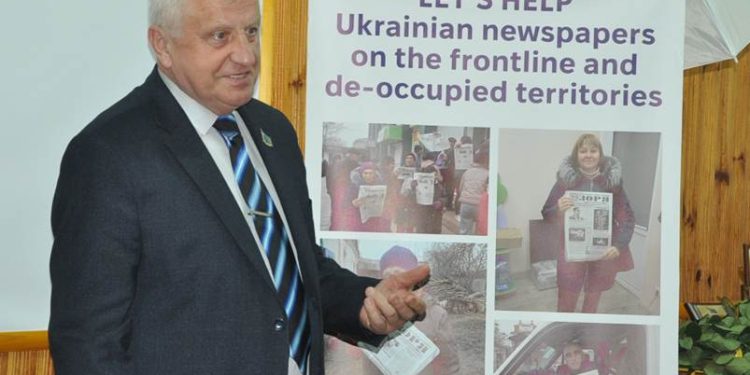Instead of 18 district newspapers, nine remained, regional publications have disappeared, and the authorities refuse to financially support print media. The head of the Rivne Regional organization of the National Union of Journalists of Ukraine (NUJU), Dmytro Tarasiuk, talks about the catastrophic situation with regional media in the border region and why local authorities do not understand the importance of the information space in war conditions.
– There were 16 districts in the Rivne Region; unfortunately, only four remained. As a journalist and someone familiar with this situation, I believe that the administrative reform carried out in Ukraine is a significant mistake. As for the Rivne Region, instead of 16 districts, 7-8 should have been created, and today one Rivne district unites the former 7. How can it be managed? This is the question.
Previously, we had 18 district newspapers; today, there are nine left. Unfortunately, regional newspapers have also disappeared. There used to be a newspaper that was supposed to celebrate its 80th anniversary this year, the Vilne Slovo newspaper, but it ceased to exist on January 1. Another regional publication, Volyn, has long ceased to exist. The former newspaper of the regional council, Visti Rivnenshchyny (editor Vasyl Burchenia), may publish one or two more issues and then either cease publication or rent out the premises, as circulation is declining due to postal issues. The premises must be rented out or sold, because the rent must be paid, and no one knows where the money will come from. Today, the only newspaper that is staying afloat is Sarnenski Novyny, which has a real circulation of over 4,000 copies. This is the only one; the others, located in the north of the region (Zarichne, Rokytne, and Volodymyrets), have between 1,000 and 1,500 copies.
In the south of the region, the situation is generally catastrophic. I don’t know how many of them will be enough to bring truthful information to the people who read them…
 When I worked as a representative of the National Council on Television and Radio Broadcasting, I did everything to create four FM radio stations. If newspapers are not developing, then FM radio can cover a significant territory.
When I worked as a representative of the National Council on Television and Radio Broadcasting, I did everything to create four FM radio stations. If newspapers are not developing, then FM radio can cover a significant territory.
Unfortunately, today, of all that I did, only one radio station remains — the Polissia television and radio company in the city of Sarny, which covers not only the Rivne Region, but also about 30 kilometers of the territory of Belarus.
Today, our government, which came to the region — both the regional council and the regional state administration — does not understand the importance of FM radio in the border areas at all.
Because we receive information from Belarus, although it can be said that Belarusian TV channels are half the battle, they all broadcast information programs from russia. And you yourself know very well what russia feeds our TV viewers and radio listeners.
In Berezne, a new government came to power, which the people had elected, and said, “We do not need this radio.” And it is a pity, because it was already so popular that it did not need to gain authority — they already had that authority. Unfortunately, this did not happen.
 On May 23, we held a meeting of the secretariat, and we adopted an appeal to the regional military administration and the regional council. On May 25, I sent an appeal signed by members of the secretariat to these two addresses.
On May 23, we held a meeting of the secretariat, and we adopted an appeal to the regional military administration and the regional council. On May 25, I sent an appeal signed by members of the secretariat to these two addresses.
The main thesis of this appeal is to draw attention to the importance of the information component in the present time. Because (I understand that hostilities are underway in the east), there is no territory in Ukraine where enemy “gifts” would not fly. They are also flying to us…
At a time when the media of the Rivne Region continue to professionally fulfill their duties, truthfully informing the population of the region about the events in the territory of our region, we are forced to state that the regional administration and council have actually distanced themselves from supporting the work of journalists for more than three years in a row.
This is evidenced at least by the fact that the development strategy of the Rivne Region for the period until 2027 in the new edition, approved by the order of the head of the regional state administration on February 28, 2025 and approved by the decision of the session of the regional council on March 28, 2025, does not say a single word about the state and prospects for the functioning of the mass media of the region.
Yesterday, I received a response, and here is what the deputy head of the administration for digital development wrote to me: “A regional program to ensure public awareness is in effect in the region, and funding for program activities is increasing every year.”
So, write how much it is growing; where are these numbers coming from? Nothing is growing there.
In general, when I appeal to the authorities to somehow pay attention and allocate some funds, even if they are meager, to support the media, the answer is: “We cannot do this, since the media are currently privately owned.”
Wait, let me give them an argument then. We have so-called Unified News on Ukrainian TV channels, which, by the way, no one watches. At the same time, the state allocates more than UAH 2 billion for the Unified News project. And who is there today? The public came out of this project, and those who remain are 1+1, Inter, STB… And whose structures are these? These are private structures, but how are they financed? There is no answer.
We have pushed forward three proposals.
First, to urgently develop a plan for financial support for printed publications, in particular, for paying for printing services.
Secondly, given that in connection with the adoption by the Verkhovna Rada of Ukraine of the Law On Media, the Law On the Procedure for Covering the Activities of State Authorities has lost force, nevertheless, in this difficult time for the country, it is necessary to conclude agreements for the coverage in the mass media of the activities of state authorities and local self-government bodies, based on the principles of civil and commercial law. Such a step will at least to some extent allow journalistic teams to save printed publications from final destruction, from which residents of the region draw reliable, non-fake information, including about the activities of government structures.
Thirdly, to initiate an appeal to the government to reduce the tax burden on the newsrooms of printed publications.
There is not even a word about any of our proposals in the response from the regional state administration. We have not yet received a response from the regional council.
 The last thing I would like to say is that this no longer concerns the Rivne Region. I want our NUJU to at least somehow find an opportunity to help the newspaper Bilopilshchyna. I have known the editor Nataliya Kalinichenko for a long time; we have been friends for a considerable period. She used to come to our Rivne training ground. We accomplished many things – we published the so-called field newspapers, and she contributed to this effort. Today, the Bilopilshchyna newspaper is in a terrible situation. We need to help it survive. Nataliya Kalinichenko is doing a lot. I congratulated her on being awarded the Order of Merit, as she truly deserves this honor. The settlement of Bilopillia is 7 kilometers from the russian border. Let’s not leave this person out of sight, because, no matter what, even though Sumy and Rivne Regions are far from each other, I worry about her. She makes titanic efforts to produce that newspaper and deliver it to the people who read it.
The last thing I would like to say is that this no longer concerns the Rivne Region. I want our NUJU to at least somehow find an opportunity to help the newspaper Bilopilshchyna. I have known the editor Nataliya Kalinichenko for a long time; we have been friends for a considerable period. She used to come to our Rivne training ground. We accomplished many things – we published the so-called field newspapers, and she contributed to this effort. Today, the Bilopilshchyna newspaper is in a terrible situation. We need to help it survive. Nataliya Kalinichenko is doing a lot. I congratulated her on being awarded the Order of Merit, as she truly deserves this honor. The settlement of Bilopillia is 7 kilometers from the russian border. Let’s not leave this person out of sight, because, no matter what, even though Sumy and Rivne Regions are far from each other, I worry about her. She makes titanic efforts to produce that newspaper and deliver it to the people who read it.

On July 3, 2025, an expanded meeting of the NUJU Board was held, attended by more than 50 representatives from the organization’s governing bodies. The main issues on the agenda were: implementation of the priority areas of NUJU activity in 2025 (safety of journalists, support for prisoners, assistance to front-line media), the activities of the network of Journalists’ Solidarity Center (JSC), support for regional media, as well as organizational issues regarding the creation of new regional structures in Odesa. The participants unanimously adopted a statement of solidarity with Ukrainian journalists in russian captivity and a resolution on the need for systematic support for local media.
NUJU Information Service

 THE NATIONAL UNION OF
JOURNALISTS OF UKRAINE
THE NATIONAL UNION OF
JOURNALISTS OF UKRAINE
















Discussion about this post